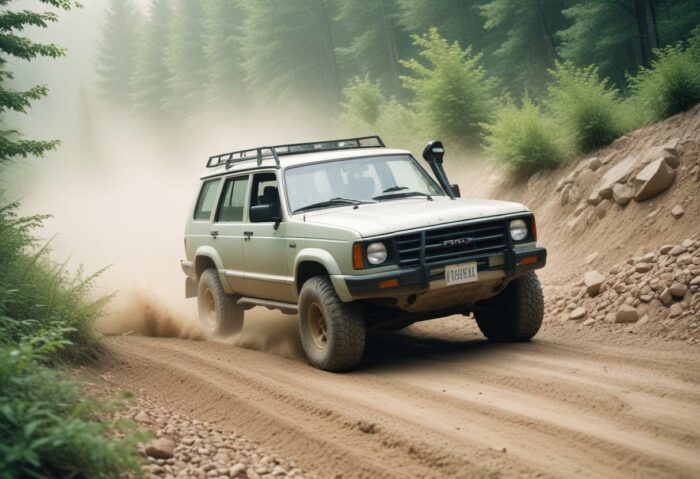As a driver who has an off-road vehicle and off-road insurance for it, your policy will cover any damages your car sustains while off-roading, but a regular car policy may not cover a regular vehicle if it gets damaged while off-roading. Most auto policies will cover vehicles for normal use.

This means dirt bikes, UTVs, and other off-road vehicles would be covered in an off-road accident as long as the driver had the right insurance.
But if you take your regular car off-road and it gets into an accident, your standard auto insurance may not cover the off-roading claims And that is because off-roading is not the normal use for your vehicle.
What is Off-Road Driving?
Off-road driving is driving a vehicle (made specifically for this reason) on natural surfaces such as snow, rocks, sand dunes, river beds, gravel, mud, and more.
Some individuals are involved in this activity for casual fun, and some people make a living from it.
How Does Off-Road Insurance Work?
Most big insurers offer special policies for off-road vehicles, but each one of them handles it differently. Some insurers sell separate ATV/UTV policies, while others include off-road coverage in their motorcycle policies.
For instance, with Progressive, you will have to list your off-road vehicle, but it’s still under a motorcycle policy, even if it isn’t a motorcycle.
If you plan to go off-roading all the time, you need specific insurance. Just like I have mentioned above, regular car insurance usually won’t cover damage from off-roading, as it likely goes against your policy’s terms.
So, if you damage your car while off-roading, you might have to pay for the repairs out of your pocket. Discuss this with your insurance agent to understand how this coverage works with your policy.
Types of Off-Road Vehicles
There are different types of these vehicles that may require their own policies separate from your regular auto coverage. These vehicles include:
- Dirt bikes
- 4-wheelers
- ATVs/UTVs
- Snowmobiles
- Golf carts
- Dune buggies
There are some vehicles that can be used for both off-roading and traditional use. For instance, some Rivian vehicles, Jeep models, and certain pickup trucks are sold because of these capabilities.
If you own a vehicle that could be covered under an off-road policy or a car insurance policy, discuss with your insurer to know exactly how the vehicle should be insured.
Can My Off-Road Insurance Claim Be Denied?
If you take a vehicle that is not designed for off-roading, such as a Honda Accord or Toyota Camry, into rough terrain or use it for off-road racing, your insurance policy may not cover any damage.
However, if you own a vehicle designed for off-road use and have the right coverage, you should be covered for any off-road claims.
To avoid having a claim denied or your policy canceled, ensure that you have the right insurance. Different companies might call it different names.
Just like I mentioned earlier, some offer separate UTV/ATV insurance policies, while others include the coverage in their motorcycle policies. Speak with your insurance provider or agent to ensure you have the right coverage.
How is Off-Road Vehicle Insured?
Vehicles like ATVs and dirt bikes need the same coverage options as other types of vehicles.
This means off-road drivers need at least a minimum of liability coverage or full coverage to pay for damages to their bikes or other vehicles.
Keep in mind that some insurers offer separate policies for this vehicle that can be bundled with your home, auto, and renters insurance for a good rate. Off-road insurance policies typically include:
- Bodily injury liability coverage: This pays for the injuries that you cause in an accident you are responsible for. For instance, if you crash into another person’s vehicle while off-roading and they need medical attention,.
- Comprehensive coverage: Comprehensive coverage covers damage to your vehicle caused by weather, fire, falling objects, vandalism, and animals. This basically covers any damage to your vehicle that wasn’t caused by a collision.
- Collision coverage: It pays for damages to your vehicle that are caused by a collision, regardless of who is responsible. If you collide with another off-road vehicle or run into a wall, this collision coverage will pay to repair your vehicle or bike.
- Property damage liability coverage: The other part of the liability coverage, property damage liability, covers damage you cause to others’s property. For example, if you damage another vehicle while you are driving or if you go off-road on another person’s land and cause damage.
Do I Need Insurance for an Off-Road Bike?
Whether you need to insure an off-road bike depends on your state law. However, from a financial perspective, you need insurance for any vehicle you own in order to protect yourself and cover any damage you cause.
Your bike needs liability coverage at least. And that pays for damages you may cause to another person or their property while you are off-road driving.
Drivers who do not have enough liability insurance will be expected to pay for any damage they cause out of pocket. This could cost about a hundred thousand dollars.
Which Auto Insurance Companies Cover Off-Road Driving?
Most auto insurance companies cover this type of driving, but every company takes a different approach to offering coverage. Some of the biggest companies that cover this area include Geico, Progressive, State Farm, and USAA.
You can discuss with the insurance company or your choice to know how they offer their own coverage. They may also offer you discounts, depending on the insurance company.
Is Off-Road Vehicle Insurance Expensive?
Costs can vary based on various factors, such as the type of vehicle you want to insure and your driving record. The best way to determine the best rates for off-road auto insurance is to compare quotes from different companies.
Each company offers different costs and coverage. So, you can choose the company that offers just what you want at affordable rates.



